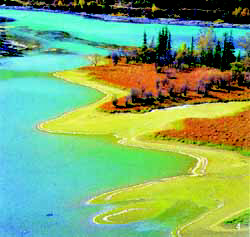 Located in the heart of the Altay Mountains and bordering Russia, Kazakhstan and Mongolia, the Kanas nature reserve sticks up in the northwestern corner of China. Its name, Kanas, is a Mongolian word that means "a beautiful and mysterious place".
Located in the heart of the Altay Mountains and bordering Russia, Kazakhstan and Mongolia, the Kanas nature reserve sticks up in the northwestern corner of China. Its name, Kanas, is a Mongolian word that means "a beautiful and mysterious place".
As its name indicates, Kanas proves to be a magical and appealing place for people of all ages. Every tourist is fascinated by the enchanting primitive beauty of its undulating mountains, crisscrossing ravines and gullies, luxurious forests and grasslands, clear waters and fresh air. Isolated from the outside world and remaining undeveloped by human beings, Kanas is acclaimed as one of the few pure lands still left on earth.
Lying in the cool temperate zone, the place has a fairly long winter, with spring and autumn usually linking up without a clear, hot summer.
The state-level nature reserve is remarkable in the country because it abounds with species typical of southern Siberia. The place boasts the only Siberian Taiga Forest in China and is a paradise for some 1,000 species of rare plants and wildlife, many of which are so rare that they can only be found here.
The nature reserve is best known for the picturesque Kanas Lake. About 1400 meters above sea level, the crescent-shaped alpine lake covers an area of 45 square kilometers - ten times the size of the famous Heavenly Lake in the Tianshan Mountains. The lake reaches 184 meters in depth, making it the deepest alpine fresh-water lake in China.
The Kanas Lake was formed some 200,000 years ago, as the result of glacier development during the last Ice Age. However, it is not historically a pool of standing water, but a section of the Kanas river, which originates from the glaciers of the Friendship Peak about 40 kilometers away.
Under the blue sky, with its fluffy white clouds, the lake water is as limpid as a mirror, decorated with the reflections of the snow-capped mountains and dense forests. A notable feature of the lake is that the water changes its color with the changing of the seasons and weather. Within a single day, the water color may turn from green to blue, grey or white.
On the top of the Camel Peak to the western bank of the lake there is an arbor called Fish Viewing Pavilion, where visitors can enjoy a birds-eye view of the entire lake and its surrounding areas of grand glaciers, gurgling streams, and verdant forests and pastures.
The Kanas Lake is known not only for its breathtaking beauty, but also for its legendary lake monster. This gives it more mystery and color.
It is said that an enormous monster has been living in the lake since ancient times, which often stirred high water sprouts and sometimes dragged horses, cattle and sheep into the water.
In recent years, scientists and explorers have been lured here in search of the truth about the monster, but no incontrovertible evidence has yet been collected. Some scientists assume that the monster could just be a rare, if outlandish, species of fish.
The lake is surrounded by a vast expanse of grasslands. About two kilometers to the south lies a village dotted with houses built of pine. This is the only settlement in China for the Tuwa people, a branch of the Mongolian ethnic group.
The song we are listening to is a folk song of the Tuwa people called Kanas ? My Hometown?. It expresses the Tuwa people?s profound love for this piece of magical land.
The Tuwa people have lived near the Kanas Lake for some 400 years, subsisting mainly from herding and hunting. Today they retain their unique language, simple life style and primitive and totemic worship of nature.
The Tuwa people are very honest and hospitable. Every tourist who drops in will be warmly received and treated with all kinds of delicacies. You can savor their unique milk tea and many other local specialties, and enjoy their singing. Maybe you won?t be able to understand what they are singing or talking about, but you will no doubt be deeply impressed by their warm-heartedness and forthrightness.
The Kanas nature reserve has a varied but wonderful scenery in all seasons, but the golden autumn is considered the best time to go there, when it shows its brightest colors and most ardent beauty.
To go there, visitors can first take a long-distance bus from the city of Altai to the county seat of Burqin, and then hire a jeep and travel north for 150 kilometers. Long as it is, the journey will be by no means tedious, because you can enjoy a wonderful view of deserts, mountains, valleys, rivers, grasslands and forests.
As for accommodation, you can either stay in the home of local residents to get an intimate feel for their folk customs and ethnic make-up. Or you can be put up at the better-equipped Kanas Mountain Villa, near the bank of the Kanas Lake, for more comfort and luxury.
(CRI October 15, 2002)
|

